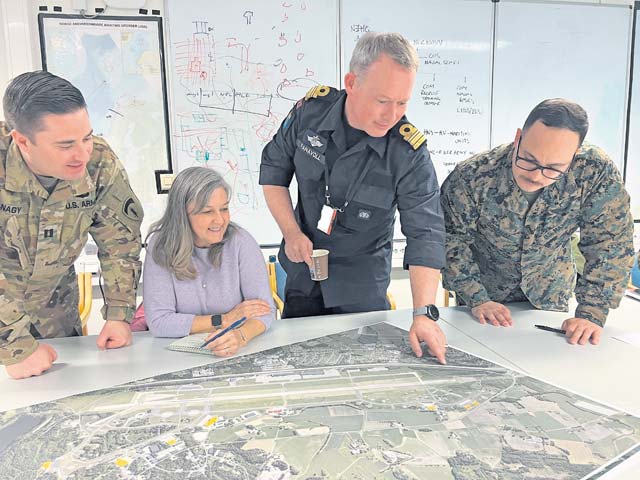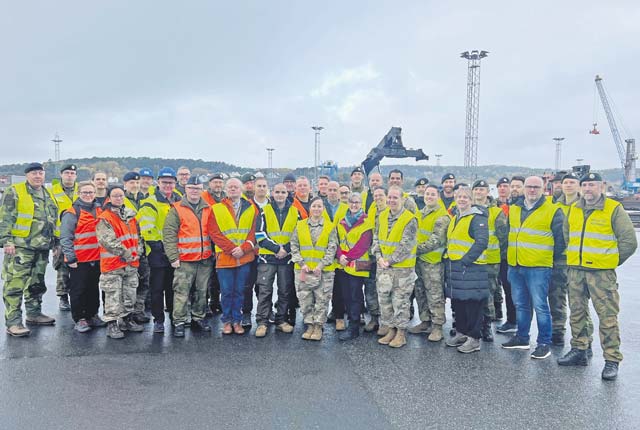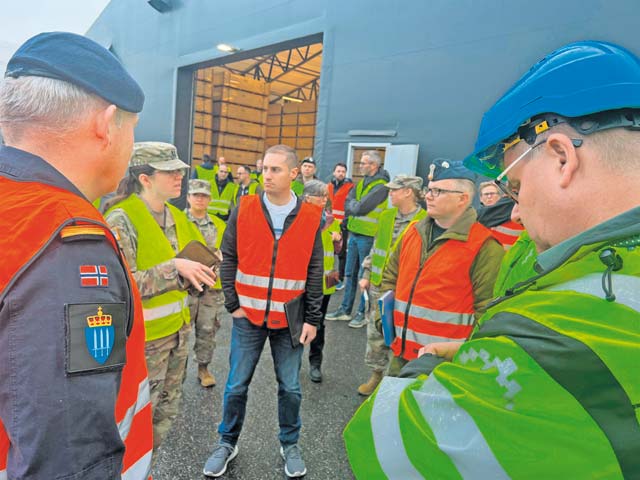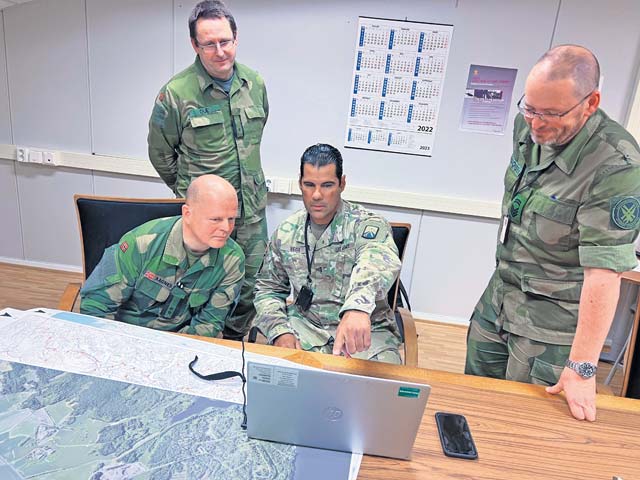
21st Theater Sustainment Command host nation staff, logisticians, representatives from Marine Corps Forces Europe and Africa and Norwegian Armed Forces, gathered October 17-21 at Rygge Air Base, Norway to plan for reception, staging and onward movement of up to 15,000 U.S. Marines and their equipment.
“If there was a major contingency, Norway is our [U.S. Marines’] doorway to Europe,” said Paul Rosenbloom, MARFOREUR/AF planner. The Marines share a long history with the Scandinavian nation, train there regularly and operate the Marine Corps Prepositioning Program-Norway. In the event Norway is under direct threat, the U.S. Marine Corps is obligated to assist in Norway’s defense.
But, according to Rosenbloom, the Marine Corps would be challenged to rapidly deploy on the scale needed for a contingency.
“I know that is what 21st TSC does, so I reached out to the experts,” said Rosenbloom.

The result was a five-day RSOM tabletop exercise coordinated by 21st TSC’s Host Nation Support. Additional participants included representatives from 598th Surface Deployment and Distribution Command, U.S. Army Europe-Africa aviation, Norway’s government and civilian sectors and observers from Sweden and Denmark. The group worked through scenarios involving aerial and sea ports of debarkation, pre-positioned stock withdrawal and ammunition flow.
According to Norwegian Navy Commander Senior Grade Anders Fanavoll, it was a significant event, involving more than 60 people. It directly supported Norwegian defense, which is based on three pillars: the Norwegian military’s ability to defend Norway, collective defense within the framework of NATO and bi-lateral support.

“It [the workshop] is a high priority because this is one of the pillars for the defense concept of Norway,” said Fanavoll. “The tabletop workshop here is looking into how to update the procedurs and how to make sure that in case we need bi-lateral support from our closest ally, the U.S., that it will work seamlessly.”
Key to seamless operations is U.S. understanding of Norway’s total defence system, according to Col. Morten Anderssen, Chief of Logistics for Norwegian Joint Headquarters.
“I’ve been in charge of Norway’s host nation support system for the past four and a half years,” said Anderssen. “I’ve traveled many places in Europe in that context, and I’ve not seen any countries that have developed a system like we have in Norway.”
The benefits of Norway’s model of civil-military cooperation was demonstrated during Trident Juncture 2018, when Norway received about 50,000 participants from 31 NATO and partner countries. When asked for feedback, a U.S. Marine truck driver reported feeling unsafe driving on Norwegian roads due military regulations limiting their speed and civilian trucks consistently passing at much faster speeds.

“We put that problem into the total defence system,” said Anderssen. “We activated the police so they conducted more road patrols. We activated the road authorities so they activated the truck stations along the routes that we used, pulled in all the trucks on the roads, informing them about the risks and to slow down. We went to national media and local media. Through the total defence system we also had discussions with unions and drivers associations and company owners, and they gave information to all the drivers. Within four hours we could report back… on steps taken. I think it would take most countries a lot more time to do that.”
21st TSC host nation support planner Denise McClure said the tabletop exercise increased her confidence in Norway’s total defence system. “It is a very responsive system that works well for Norway. Their government has tremendous authority in nationalizing assets when required.”
Running through the tabletop scenarios helped identify strengths and challenges for both the sending (U.S.) and receiving (Norway) nations. In addition to clarifying logistical needs, participants established personal contacts, built relationships, and demonstrated a shared commitment to assure allies and deter adversaries.
Fanavoll said the current Ukrainian crisis has highlighted the power of logistics in military conflicts.
“Both in [terms of] what happens when you are unable to do logistics, as the Russians are, and if you are able to do logistics, as we are now for the Ukrainians,” he said. “That can be decisive. For us, just showing that we are planning for this, and doing this unclassified… I think that would be quite a deterrence. To show them that we are able to do this kind of operation.”
Tabletop organizers said the ultimate goal of the workshop was to increase the level of interoperability between the U.S. and Norway.
“The last couple of days we have taken steps in that direction,” said Anderssen “Our time has been well-spent.”


